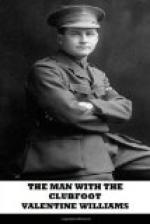I gave the man a gulden and bade him get me a cab.
It was still pouring. As we rattled away over the glistening cobble-stones, my mind travelled back over the startling events of the day. My talk with old Dicky had given me such a mental jar that I found it at first wellnigh impossible to concentrate my thoughts. That’s the worst of shell-shock. You think you are cured, you feel fit and well, and then suddenly the machinery of your mind checks and halts and creaks. Ever since I had left hospital convalescent after being wounded on the Somme ("gunshot wound in head and cerebral concussion” the doctors called it), I had trained myself, whenever my brain was en panne, to go back to the beginning of things and work slowly up to the present by methodical stages.
Let’s see then—I was “boarded” at Millbank and got three months’ leave; then I did a month in the Little Johns’ bungalow in Cornwall. There I got the letter from Dicky Allerton, who, before the war, had been in partnership with my brother Francis in the motor business at Coventry. Dicky had been with the Naval Division at Antwerp and was interned with the rest of the crowd when they crossed the Dutch frontier in those disastrous days of October, 1914.
Dicky wrote from Groningen, just a line. Now that I was on leave, if I were fit to travel, would I come to Groningen and see him? “I have had a curious communication which seems to have to do with poor Francis,” he added. That was all.
My brain was still halting, so I turned to Francis. Here again I had to go back. Francis, rejected on all sides for active service, owing to what he scornfully used to call “the shirkers’ ailment, varicose veins,” had flatly declined to carry on with his motor business after Dicky had joined up, although their firm was doing government work. Finally, he had vanished into the maw of the War Office and all I knew was that he was “something on the Intelligence.” More than this not even he would tell me, and when he finally disappeared from London, just about the time that I was popping the parapet with my battalion at Neuve Chapelle, he left me his London chambers as his only address for letters.
Ah! now it was all coming back—Francis’ infrequent letters to me about nothing at all, then his will, forwarded to me for safe keeping when I was home on leave last Christmas, and after that, silence. Not another letter, not a word about him, not a shred of information. He had utterly vanished.
I remembered my frantic inquiries, my vain visits to the War Office, my perplexity at the imperturbable silence of the various officials I importuned for news of my poor brother. Then there was that lunch at the Bath Club with Sonny Martin of the Heavies and a friend of his, some kind of staff captain in red tabs. I don’t think I heard his name, but I know he was at the War Office, and presently over our cigars and coffee I laid before him the mysterious facts about my brother’s case.




